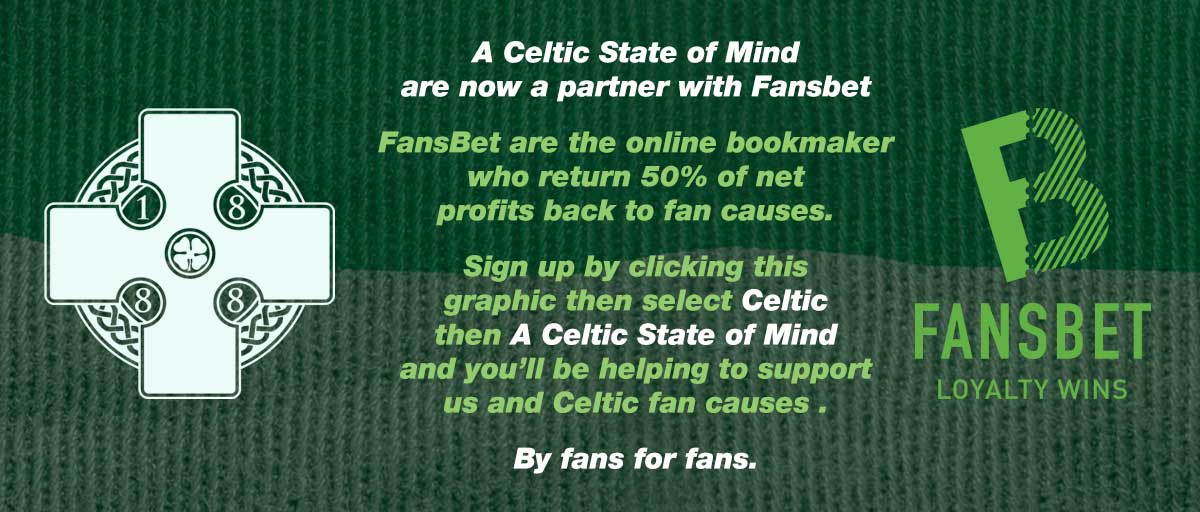On the 21st May 2017, Celtic were completing a domestic league season unbeaten with a two nil victory over Hearts. Before the game an impressive crowdfunded display organised by the Green Brigade was shown to the worldwide tv audience. It was a fitting tribute.
On the 67th minute the Green Brigade had organised another tribute to the most famous Celtic team ever. Its idea came from the song that the support had been singing on the 67th minute of every game that season. As “In the heat of Lisbon” started the rail seating section was covered in green and white strips of polythene, dozens of flares were lit and held aloft causing smoke to sweep across the stands and pitch.
This caused more publicity than the original display and was shared far and wide on the social media channels that promote ultra culture. It was also lauded by the Celtic support.
Ultras are still new to Scotland. The scene is just over a decade old and the authorities are struggling to understand the appeal to young fans. The Scottish way, since 1980, is to confuse fan culture with criminality. Assaulting players, throwing coins, lighters, pyrotechnics, bottles or coconuts is not a reflection of fan culture but only a reflection of the person committing these acts. As the BBC’s correspondent, Tom English, said the other evening: “These guys have zero regard for their club, their fellow fans or the players on the pitch. Total arrogance and ignorance”.
Authorities have always been wary of groups of people congregating and thinking for themselves. Celtic fans went from brake clubs to Celtic supporters clubs and have a history of being organised before Yugoslavs returned home from the 1950 World Cup impressed by the Brazilian Torcida. The Hajduk Split fans formed the Torcida Split fans group after that trip.
Italy is seen as the home of the ultra and the first modern ultra group was formed by AC Milan fans. The Fossa Dei Leoni were formed in 1968 by students who wanted the Curva Sud to represent the working class culture of Milan. Inter Milan fans were also encouraged by legendary Argentinian Helenio Herrera to copy the relentless support of his homeland Barras Bravas.
It’s no surprise that Celtic has seen ultra culture as a perfect extension of our fanaticism. We have always been an inclusive support that proudly reflects our history, community and culture. The rebel spirit and anti establishment stance that all ultra groups have is born into us and our founding story of charity is the clarion call and has always being part of our thinking. This has attracted fans from Europe to make the pilgrimage to Celtic Park and base themselves in the East End for a few days. Like-minded fans from Dortmund, St Pauli, Livorno and Feyenoord have been regular visitors to Celtic Park and their influence is felt.
We, of a certain age, were first introduced to Italy’s ultras by Channel 4 on a Sunday afternoon. It was portal into another world of smoke, water cannons and colour. With the world getting smaller and footage of ultras easy to get hold of, coupled with stadiums getting more sterile, where we are now is a natural progression and the backward thinking of authorities shouldn’t be a surprise.
The Offensive Behaviour Act (OBA) failed due to this backwardness and the knee jerk nature of its implementation. It was brought down by the power of the collective, by those that matter; the fans who go to the games. A defeat to the establishment on this scale was always going to have repercussions for us all and strict liability is their new toy to ensure we all get back in line as they paint all football fans as a sinister threat to society. The only thing sinister here is the political juggernaut, hell bent on implementing legislation into football by forced injection while ignoring the justice system already in place and their media kowtowers who are shrilling like dog whistles .
The OBA encouraged certain behaviours and if you encourage certain behaviours then you shouldn’t be surprised if those behaviours happen. What we are seeing now is a direct consequence of this failed legislation which focused on football as a criminal activity, not a pastime, and still sees fans treated like criminals when travelling and attending games. This is despite statistics proving that football is relatively trouble-free and there are more arrests at most big music events in Scotland. This stat shows that it’s a societal problem where exuberance, alcohol and large crowds can lead to reckless criminal behaviour.
Fans Supporters Europe, an Independent fans body, with members from over forty countries, have been vocal that strict liability doesn’t work as punishment for football fans. UEFA have had strict liability in place for years and still clubs are blanket fined for the indiscretions of the few. It’s a system where a banner against UEFA will get you a bigger fine than racist chanting.
Other countries challenge anti-social behaviour in the stands in other ways. These countries, as with ours, haven’t got much to offer as the product is poor compared to the top five leagues in the world, but they realise the importance of having a riot of passion and colour. We are the spectacle and the attraction. Celtic Park is heralded on European nights because of what happens off the pitch. Our recent Europa League game against Valencia saw UEFA President, Aleksander Cerferin, attend as he wanted to be part of the Celtic Park experience.
The Swedish Professional Football League and Swedish Supporters Football Union recently announced a five year plan to have the “best supporter cooperation in Europe”. This plans to build on the work already done, which has seen attendances rise and behaviour improve. At a recent Europa League tie, between Malmo and Chelsea, the atmosphere was praised by the visiting players. While the authorities have acknowledged that there is still work to do, they take pride in what has already been achieved.
Scandinavian neighbours, Norway, also have an open dialogue policy. This has seen attendances and interest in the league increase and the legalisation of planned pyrotechnics displays before and after games. The authorities put the ultras through health and safety courses and are looking to test smokeless flares in the near future. In France they are about to test cold flares. This shows that if you have progressive authorities and dialogue things can be achieved to benefit the game.
The first Supporter Liaison Officer (SLO) was appointed in Germany in 1991. They have been commonplace in Europe since then and the Swedes and Norwegians agree that a big part of their success have been due to these roles. The SLO is there to be the link between the club and support. They are not there to support one side or the other but to communicate both parties’ wishes and find solutions. Supporters Direct Scotland have campaigned since 2016 for all clubs in Scotland to have designated SLO’s and there has been a 700% increase in their number since the project began. They now provide SLO training days and it is now an SFA requirement for clubs wishing to achieve gold or silver standard, to have an SLO.
The SLO isn’t a firefighter or a buffer for the club’s hierarchy to hide behind. They are an integral part in the biggest relationship that a club has and if clubs get it wrong and don’t use the role correctly it will erode trust. Celtic lead the way in their appointment of John Paul Taylor a few years back. Celtic have been heavily involved with workshops with European SLOs and, for me, this is an acknowledgment that we are closer to our small European neighbours than to those south of the border. Like the Allsvenskan and Eliteserien, all we have to offer is the fan experience.
The introduction of a more European style of support isn’t going away and it is going to grow with channels like Copa 90 showing spectacular displays and corteos, which the Celtic support have readily adopted and which we should adopt. The ethos of ultra culture reflects Celtic supporters culture from the brake clubs until today.
One thing that has been really clear is that no-one in power wants to be adult about how we treat football fans. We can’t make money from fan culture on one hand while trying to criminalise it on the other. It feels like Thatcher’s view of us is pinned up in the corridors of Holyrood and happily wheeled out when it suits, or when the police have a funding issue. There are a myriad of organisations that all have a stakeholder interest in football. The biggest stakeholders in football are you and me. It’s time for adult discussions where we will say things that will upset, but saying them will take us down roads that were once unpassable and it will all be for the good of the game.
Kevin Graham
Listen to the award-winning A Celtic State of Mind podcast


Leave a Reply
You must be logged in to post a comment.